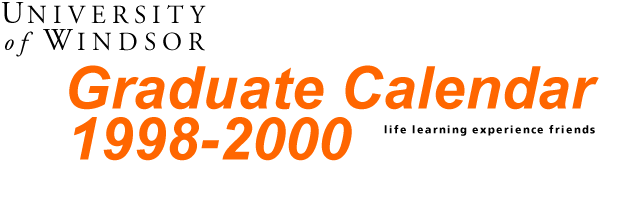

| COLLEGE OF GRADUATE
STUDIES AND RESEARCH
Structure of the College
PROGRAMS OF STUDY EconomicsEducation Engineering - General Regulations
English
Geography
Mathematics & Statistics
|
15.2
Programs of Study
15.2.1 THE MASTER OF ARTS DEGREE Programs of Study The Department of English offers programs leading to the M.A. in English and Creative Writing and the M.A. in English Literature and Language. Within the English Literature and Language program, there are three different streams: the Thesis Stream, the Course Work Stream, and the Cultural Studies Stream. The English and Creative Writing program allows students to combine
graduate-level study of literature with advanced work on creative writing
in a two-term workshop and by developing a significant independent writing
project. Within the English Literature and Language program, the Course
Work Stream offers exposure to a wide variety of topics in literature and
linguistics. The Thesis Stream allows students to investigate a single
topic in depth through independent, extended research with faculty supervision.
The Cultural Studies Stream is intended for the student who wishes to work
across traditional academic and creative disciplines to explore a cultural
studies topic in depth.
M.A. IN ENGLISH AND CREATIVE WRITING 26-590. Creative Writing Seminar (over both the Fall and Winter terms) 26-794. Creative Writing Project (a novel, a play, a collection of poems or short stories) and four graduate seminar courses. M.A. IN ENGLISH LITERATURE AND LANGUAGE Thesis Stream 26-797. Thesis/Project (of at least 20,000 words) and
Cultural Studies Stream 26-585. Literary Genres: Criticism/Cultural Studies 26-797. Thesis/Project (of at least 20,000 words) and four graduate seminar courses. Course Work Stream Eight graduate seminar courses. For all programs, students who have not taken 26-309 (Scholarship and Bibliography) or its equivalent must include 26-500, a four-week course in Methodology (offered on a Pass/Non-Pass basis), in addition to their regular course load. Admission Requirements In addition to the requirements set forth in 1.3 and 1.6.1 for admission to the College of Graduate Studies and Research and to programs leading to the Master's degree, applicants for admission to the Candidate year in the programs leading to the Master of Arts degree in English should have the following undergraduate preparation: 1) Some courses, normally four, in the pre- and early-modern periods, that is, from Old English through the Eighteenth Century; 2) Some courses, normally four, in the modern period, that is, the Nineteenth and Twentieth Centuries, including Canadian and American; 3) Some courses, normally two, from the areas of Critical History, Theory and Approaches, Scholarship and Bibliography, and Language and Linguistics; 4) Additional courses from any of the above areas to make up the total number of courses required for an Honours English B.A. Students who are deficient in any of these particular requirements may
be asked to register in appropriate undergraduate courses in order to satisfy
the requirements (see below, "Qualifying or Placement Examination").
Qualifying or Placement Examination: An applicant for admission to the Candidate year for the Master's degree who is deficient in any of the stated requirements for admission to this level of graduate study may be invited, or may request, to write a qualifying examination. A similar examination is available as a placement test, on the basis of which students in the two-year M.A. program may be granted advanced standing. Students from other universities may arrange to take these examinations in other centres provided the program coordinator is notified well in advance. Counselling: Students admitted to one of the Master's degree programs in English will be assigned a faculty advisor who will be available to counsel them on all aspects of their work. The program coordinator (or a delegate) must approve a student's program of study before registration. Grades: After admission to candidacy, graduate students in the
M.A. program in English must maintain at least a B- average, but graduate
credit is given only at the A and B level. A student whose grade in a graduate
course is less than B- may be allowed to repeat the course or to substitute
another for it, at the discretion of the Executive Dean of Graduate Studies
and Research and the program coordinator. The student may not repeat more
than one course (see 1.4.3).
|

|
©1997 University of Windsor Although care has been taken in preparing the information in this site the University of Windsor cannot guarantee its accuracy. |